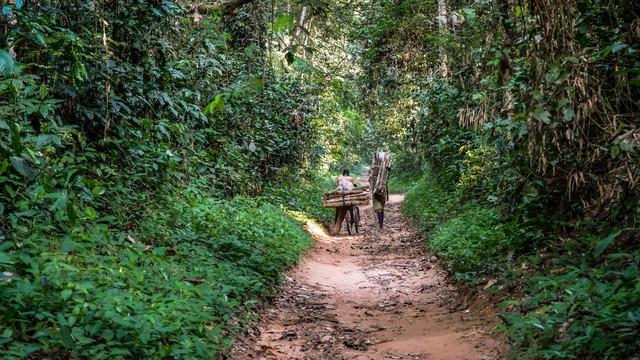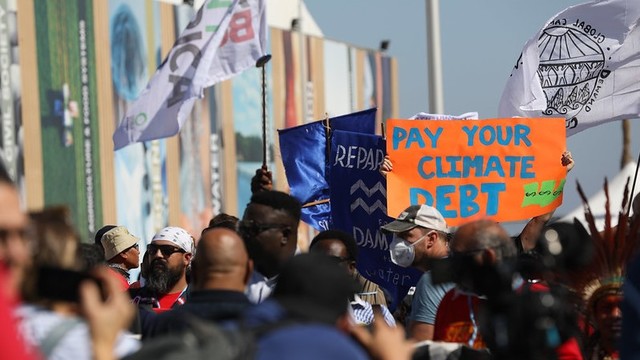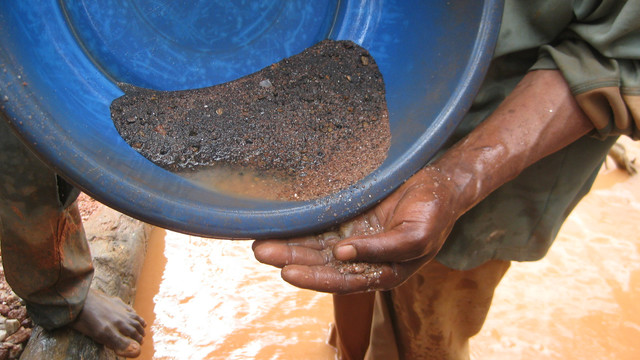IIED Annual Report 2007/08: A shared vision
This annual report looked at how people have powered IIED, from its past to the researchers and partners shaping futures all around the globe: in short, the human face of sustainable development.
Featured project highlights
Climate change
Making adaptation planning fully democratic: thanks to an IIED-run climate network, a number of the world’s poorest countries involved all sectors of society in mapping out their national plans for climate adaptation.
Airing ideas for greener aviation: with the UK-based Carbon Consultancy, IIED worked out easy ways for consumers and airlines to shrink their flight emissions.
Giving climate change a human face: IIED – one of the first NGOs to recognise and act on adaptation – ensured that the issue topped the international climate agenda through the post-2012 regime and beyond.
Governance/FIELD
Defending Peru’s living legacy: the indigenous farmers of Cusco grow 2,000 varieties of potato. IIED’s legal arm FIELD backed a local NGO working to safeguard this rich bio-heritage by helping to ban genetically modified crops from the region.
Keeping heads above water: a warming Arctic threatens sea level rise round the globe. With support from FIELD, coastal communities in the far North and small island states banded together to find workable ways of coping.
Navigating challenges on the high seas: most of the world’s ocean area is outside national jurisdiction, threatened by human activity and largely unprotected. A potential solution is the ‘marine protected area’ scheme, explored by FIELD in a widely disseminated guidebook.
Human settlements
Supporting slum dwellers’ savings plans: community savings schemes and initiatives can improve life dramatically for the urban poor. IIED began co-running a fund that channelled US$4.8 million to 40 such projects in 17 developing countries.
Revealing the positives in urban growth: IIED worked on untangling the complex realities of urban growth worldwide and, with the UN Population Fund, putting into action a strategy outlining positive responses to the coming challenges.
Mapping the metamorphosis of cities: self-built water and sanitation projects in slums are transformative, generating both skills and healthier environments. Under an IIED programme, grassroots experts from five developing countries identified the best approaches to local investment, with an eye to replicating success round the world.
Natural resources
Getting to the root of fair forest management: forests are globally important for climate, biodiversity and local economies. When the World Bank called for a global forest partnership, IIED consulted 600 forest experts and reviewed 50 initiatives to prove the need for a bottom-up alliance.
Balancing the biofuels debate: once hailed as an economic boon for poor countries and an ideal green fuel, biofuels had become controversial. IIED’s high-profile research on the links between biofuels, climate change and land access informed and balanced a heated international debate.
Bridging the barriers between global issues: IIED’s Poverty and Conservation Learning Group, which includes over 100 organisations, used their annual symposium to examine the interconnections between biodiversity, poverty and climate change.
Recharging reform in Ghana’s timber trade: Ghana was poised to make a new deal on legal timber imports with the European Union, but its dwindling forests were a growing source of conflict. IIED and partners diagnosed the policy reforms to ensure future agreements are democratic and effective.
Supporting India’s crop resilience experts: many village women in India’s Telangana region are expert in climate-proof farming. With IIED and a local NGO, they researched what makes for successful sustainable food systems.
Helping West African women be heard: IIED’s Making Decentralisation Work programme helped West African women emerge from the shadows to participate in local decision-making.
Restoring rights on a fast changing continent: in many parts of Africa, tourism and growing demand for energy and commodities were pushing the poor off their land. With local partners, IIED offered key training in the legal tools needed to reclaim a measure of control.
Sustainable markets
Exploring a future for fossil fuels: IIED was working in the Arctic, Central Asia and Africa to encourage energy industries that work for business and the poor.
Safeguarding nature while fostering livelihoods: IIED’s ‘payment for ecosystem services’ programme – where farmers are paid to safeguard a watershed or forest – inspired policy change in several developing countries.
Cultivating a just global food system: an IIED-led consortium of researchers and development practitioners unearthed hard evidence on what it takes to forge a fairer ‘food chain’: bringing the 1.9 billion rural poor who depend on small-scale agriculture into today’s ‘plot to plate’ system.
Communications
Weaving new strands into the world wide web: IIED’s new website was designed to offer free access to key online material for researchers, students and communities in poorer countries, providing new opportunities for teaching, learning, creating and communicating knowledge.
Bringing Southern media to the climate talks: Northern journalists hugely outnumber Southern at the yearly international climate conventions. With partners Internews and Panos, IIED helped redress the balance in Bali by inviting and supporting nearly 40 journalists from developing countries.
 Download the 2007/08 Annual Report from IIED's Publications Library
Download the 2007/08 Annual Report from IIED's Publications Library


